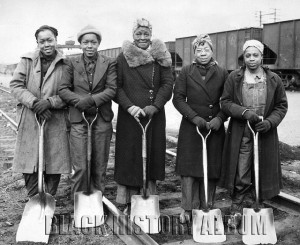The gendered mystique that still poses barriers to African-American women in their personal and public lives is perhaps best described as an “unfeminine mystique” – the idea that they have characteristics and embrace lifestyles that are outside the boundaries of “real” womanhood. This “unfeminine mystique” has plagued African-American women for more than 200 years.
In the early 19th century, a new definition of femininity was applied to white woman. In sharp contrast to the colonial idea of women as helpmates and fellow providers for their family, the Victorian ideal of “true womanhood” emphasized women’s seclusion from the public world of work and social interactions. The True (White) Woman was depicted as sexually innocent, innately submissive, and incapable of making her way through life without a man to protect her. Black women, by contrast, were seen as indelicate because of their work and social activities outside the home. They were depicted as sexually profligate and dominant over men. They abandoned their children to engage in paid labor. And they often raised children without a man in the home.
The idea that African-American women were “unfeminine” masked the fact that they most of them simply had little control over their sexuality, childbearing, or work experiences. But it justified denying them the privileges and respect supposedly accorded to those who conformed to the stereotype of “the weaker sex.”

Rather than investigate the external economic and social pressures that put extra strain on relationships in many African-American communities, many observers — including some black leaders and churches — castigate black women for failing to create male-headed families that are seen as vital to the success of black people. Employers assume African-American women are all single-mothers and unreliable workers. Policymakers stereotype African-American women as sexually irresponsible, blame them for the economic and social challenges facing black children, and use those claims to justify denying social assistance to struggling families. And, sadly, African-American women often buy into “unfeminine mystique,” blaming themselves for not being able to form successful intimate relationships while at the same time experiencing frustration for not being as strong and independent as they are assumed to be. What is needed are truly liberating images of African-American women — images that portray them as fully human with all the vulnerabilities and strengths that entails.

Comments 1
The UNFEMININE Mystique: Stereotypes about African-American Women » Council on Contemporary Families | Monique Charles — December 3, 2014
[…] Source: thesocietypages.org […]